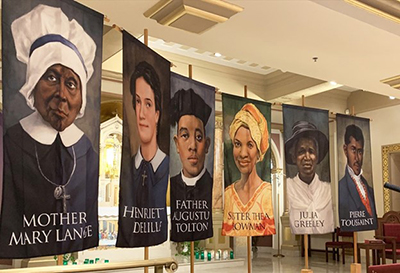Black Catholics are rallying to get the “Saintly Six” — six Black American candidates for sainthood — canonized by the Vatican.
By Rev. Dorothy S. Boulware
(Source Words in Black):
Black Catholics in America, who are three million of the 1.3 billion church members, are angry about a lack of representation in the church. Of those polled, three-quarters say opposing racism is essential to their faith and that churches should offer a sense of racial affirmation, according to recent Gallop polling.
But what specifically has them riled up is that of the 11 Americans canonized as saints by the church, none of them is African American. How can that be?
The saints who are Black are from African countries.
African Americans make up at least 3% of Catholics in America, a number that could be 1.375 billion, according to the Association of Statistics of American Religion Bodies, which issues those numbers every 10 years.
At the same time, the number of Black saints from this country is nowhere near a 3% representation. In fact, the saints who are Black are from African countries.
“I was meditating in the chapel of the neighborhood school, wondering what I would say to these young people about the racial problems that continued to arise,” the Rev. John Johnson, co-chair of the Commission in Racial Harmony for the Diocese of Baton Rouge, said in “A Place at the Table: African Americans on the Path to Sainthood,” a documentary about The Saintly Six.
The Saintly Six, as they are called, are six Catholic African American candidates for sainthood: Mother Mary Lange, Father Augustus Tolton, Mother Henriette DeLille, Pierre Toussaint, Julia Greeley, and Sister Thea Bowman.
“The Saintly Six are already saints in my mind. I have come to admire and respect each of the lives they’ve lived,” Mary H. Sewell, one of the leaders of the cause, told the AFRO in October.
It’s more than a racial issue.
Johnson said he noticed the image of Jesus was white, the image of Mary was white, and the image of St. Michael was white. “The only image that was dark was that of Satan,” he said.
In the same documentary, Deacon Ajani Gibson from the Archdiocese of New Orleans said it’s more than a racial issue.
“It’s an ecclesial gospel Christo-centric issue. We are a nation that has been making disciples that have contributed to the traditions and the patrimony of the church and the fulfillment of his command to make disciples of all nations.” Gibson said it’s past time for this to be highlighted, “especially when sometimes the church is told we aren’t Catholic enough.”
But they are not just complaining about their lack of representation among the saints; they are determined to see the elevation of those they feel should be considered for sainthood.
“I have never prayed in color or based upon nationality. However, when it was brought to my attention that there are no African American saints, I wondered why. I felt I had to do something to help change that,” Gibson said.
The movement began two years ago with a letter-writing campaign spurred by the Social Justice Circle of St. Ann’s Roman Catholic Church in east Baltimore. And each year, more letters have been sent, but nowhere near the required thousands.
On November 1, All Saints Day, the committee met at the Vatican with the appropriate officials to make their voices heard — not only about the need for equality in the sainthood, but also about the possibility of overriding the long sainthood process.
And now they wait.
“They loved when they were hated. They forgave when they were being despised. They showed compassion and mercy though little of it was given to them,” said Washington Auxiliary Bishop Roy E. Campbell, referring to the Saintly Six at a 2021 Black Catholic History Month gathering.
“We stand on their shoulders and the shoulders of many others, and we are called to do the same as Black Catholics today. They trusted in God’s mercy. They trusted in God’s grace. They believed in their people, and they believed in their nation.”

